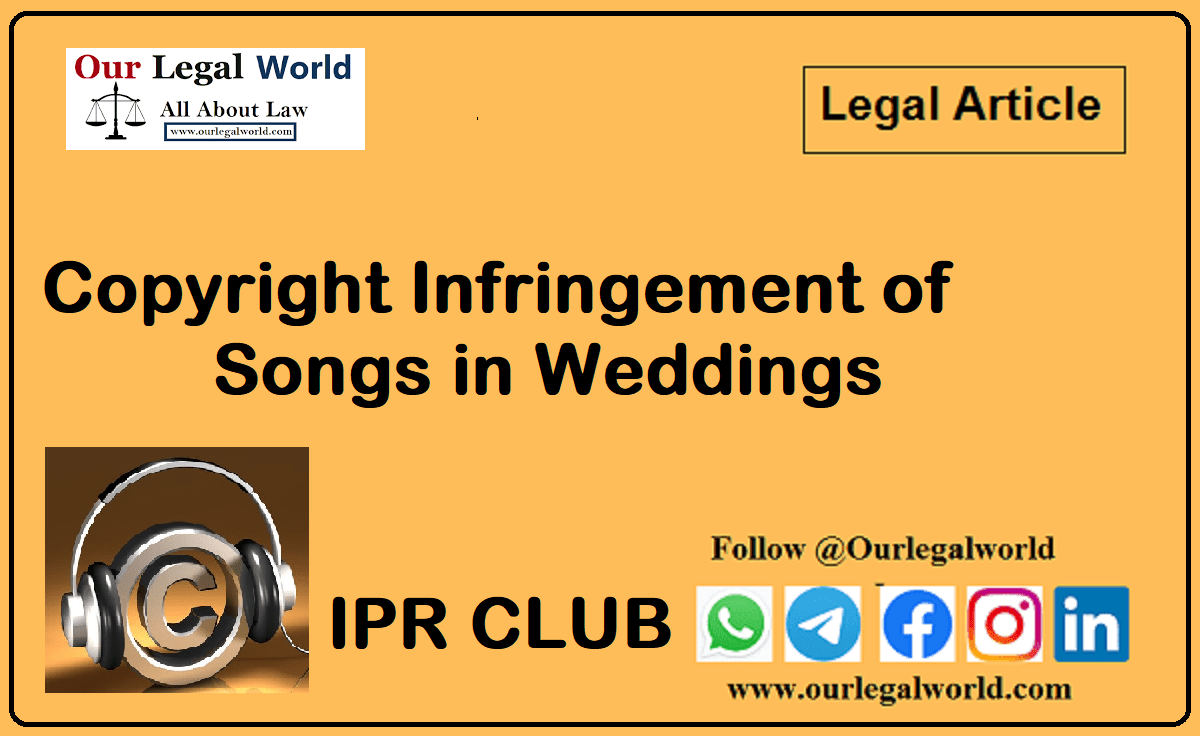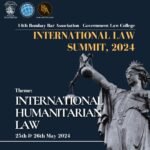Copyright Infringement of Songs in Weddings
Written by Shubhra Pallavita Satpathy [KIIT SCHOOL OF LAW, BHUBANESWAR]
Introduction
Consider a film in which there is no background music. Not very appetizing, is it? Isn’t the day of your wedding its own film? What would it be without the music, then? Music is essential to the soul when love is all that is in the air and hearts are filled with warmth! Without music, a wedding is never really a celebration. But what if the music that you’re playing at you wedding is a copyrighted music and you have no license for it?
Playing unlicensed music at weddings raises the question of whether or not copyright infringement occurs in the recent case of Phonographic Performance Limited (PPL) v. Lookpart Exhibitions and Events (LEE)[1], therefore with the aid of The Copyright Act, 1957 and a few significant case laws, jurisprudence can be studied in this area to determine the precise norm that must be adhered to and point out the correct law that must be followed.
Play of Section 52 of Copyright Act,1957
Section 52(1)(za) [2]of the Copyright Act, that lists exceptions to the infringement rule (fair use), states that “the performance of a literary, dramatic, or musical work or the communication to the public of such work or of a sound recording in the course of any bona fide religious ceremony” will not be considered copyright infringement. This includes marriage processions and social festivities associated with weddings, which are regarded as religious ceremonies under this clause. Therefore, playing music that is unlicensed shouldn’t present any problems; sadly, this is not the case. Since the law is heavily fact-dependent, each “fair use” issue must be evaluated individually.
The petitioner in Devendrakumar Ramchandra Dwivedi vs. State of Gujarat & Ors[3]. filed a Public Interest Litigation (PIL) in the Gujarat High Court. The petitioner challenged notices sent by one of the respondents, a copyright society and license issuer for public sound recordings, to various hotels, clubs, and restaurants requiring them to pay royalty in order to play music. The petitioner claimed that no license should be required because Dandiya/Garba is a Gujarat state tradition that has been honored since before the Copyright Act was enacted.
In this instance, the court determined that Section 52(1) broadly refers to nonprofit performances of music and other non-dramatic works. The underlying idea is to exempt live performances of these works when they are used exclusively for charitable, educational, or religious reasons rather than for private financial gain, have no entrance cost, and have no commercial motive.
In another case Novex Communications Pvt. Ltd. v. Union of India & Ors.[4], before the Punjab and Haryana High Court, interpreting Section 52(1)(za) of The Copyright Act, 1957., the government (respondent) informed the public that no license would be needed to use sound recordings in religious ceremonies like marriage and even in various social celebrations associated with marriage. The court followed the precedent of the case of Phonographic Performance Ltd. v. State of Punjab (2011), [5]in which it was held that “Marriage is entirely a different entity from those functions which are connected to the marriage and also the tariff regime applies to the performances at those functions and even it is having a religious overtone”. The court further found that the government’s notices interpreted Section 52 too broadly, that they might be readily exploited for commercial advantage under Section 54, and that they would violate the rights of copyright holders to file civil lawsuits under Section 55. Apart from being against the “separation of powers” doctrine, the notices ultimately violated the decision made by the same court in the Phonographic Performance case.
In 2019, the Copyright Office published a Public Notice[6] that provided further clarification. It stated that “using any sound recording during a religious ceremony, such as a marriage procession or other social festivities connected to a marriage, does not amount to copyright infringement and thus no license is required to be obtained for the said purpose.”
Also Read: Economic Significance in Inventions: Patentable Enough?
But again the same issue arose in the case of Phonographic Performance Limited vs LookPart Exhibitions and Events Pvt. Ltd that covers an injunction suit and copyright infringement brought by PPL against Lookpart Exhibitions and Events Private Limited for the unlawful use of sound recordings at numerous social events that the Defendant planned and arranged. The Defendant contended that since the music is performed for marriage ceremonies and other social gatherings associated with marriages, a license from PPL is not necessary, citing Section 52(1)(za) of the Copyright Act, 1957. The case was withdrawn in view of amicable settlement between the parties. Delhi High Court takes on record the report submitted by the court appointed expert Dr. Arul George Scaria[7].
The report of Dr. Arul Geoge Scaria can be accessed here. Click here
The report of Dr. Arul George Scaria mentioned;
8. S. 52(1)(za), including the explanation provided therein, warrants a broad reading in view of the legislative intention as well as the Indian socio, economic, legal and cultural context. The following specific aspects may be taken into consideration by the Court while adjudicating the scope of S. 52(1)(za). First, marriage is one of the most important social institutions in India and marriage ceremonies as well as the related festivities are given the highest importance by most communities in India. S. 52(1)(za) needs to be interpreted in a manner that protects and promotes the important constitutional right under Article 21 of the Constitution to perform marriage and engage in marriage related festivities in accordance with one’s own tradition and culture. Second, the existence of criminal remedies for copyright infringement, combined with the fact that copyright owners are not required to go through any formal examination system to claim copyright ownership over any subject matter, makes it important to limit the scope of rights of copyright owners in the context of official and religious ceremonies, and more specifically ceremonies and festivities associated with marriages. As copyright infringement is also now interpreted by the Supreme Court as a cognisable and non-bailable offence under S. 63 of the Act, a narrow reading of the provision may lead to potential harassment by police officers and copyright owners during one or more of the important ceremonies or festivities associated with marriage. Third, potential police intervention during marriage or any social festivities associated with marriage is also a potential threat to the right to privacy guaranteed under the Constitution.
10. The Court may also examine whether the invitees to a marriage can be considered as “public” under the Act for the purpose of analysing whether there is a violation of right of public performance or right of communication to the public. While the Indian copyright statute does not define the term ‘public’, relevant case-laws suggest that ‘public’ has to be understood in accordance with the ‘character of the audience’. In the specific context of marriages in India, invitees are generally limited to those from family and social circles of the partners in the marriage. Hence, there may not be a violation of the right of public performance or right to communicate to the public.
11. Finally, a balanced copyright system necessitates drawing a delicate balance between the rights granted to copyright owners through exclusive rights and the rights provided to the society/ users of copyrighted works through limitations and exceptions. The social, cultural, historical, and legal context of S. 52(1)(za) warrants a balanced interpretation of the provision to ensure protection and promotion of social benefits.”
Conclusion
The Copyright Act of 1957’s Section 52(1) have ambiguous interpretation. The DJ performances and other comparable events at a marriage are not protected by The Copyright Act, 1957’s Section 52(1)(za) regarding phonographic works. In order to determine which activities are related to religious ceremonies or events and which ones are not, rules for copyright infringement should be established—ideally by the legislature rather than the courts. Performance of unlicensed music at those most common events can be classified as fair use, under Section 52(1)(za). As mentioned above the Copyright office via a Public Notice clarified situations such as social gatherings or marriage ceremonies, licenses are not needed to use sound recordings. In addition, the Notice makes it clear that using any sound recording during a religious ceremony such as a marriage ceremony or other related social events does not violate copyright and does not, therefore, call for a copyright license.
[1] Phonographic Performance Limited (PPL) v. Lookpart Exhibitions and Events (LEE). CS(COMM) 188/2022
[2] The Copyright Act, 1957,52(1)(za), Acts of Parliament, 1949 (India)
[3] Devendrakumar Ramchandra Dwivedi vs. State of Gujarat & Ors, MANU/GJ/0440/2009
[4]Novex Communications Pvt. Ltd. v. Union of India & Ors., CWP No. 28758 of 2019 (O&M)
[5] Phonographic Performance Ltd. v. State of Punjab (2011), MANU/PH/2110/2011
[6] https://copyright.gov.in/Latest_Notice37.aspx
[7] “Indian wedding ceremonies copyright Infringement case”, https://iprmentlaw.com/2022/10/16/indian-wedding-ceremonies-copyright-infringement-case-ppl-withdraws-suit-in-view-of-amicable-settlement-court-appointed-expert-dr-arul-george-scarias-report-taken-on-record/, (last visited on October 27th, 2023)




![Call for Campus Ambassadors by Our Legal World [2 Months; Virtual]: Apply by June 15](https://www.ourlegalworld.com/wp-content/uploads/2024/06/Logo-New-136x150.png)


